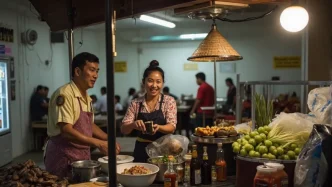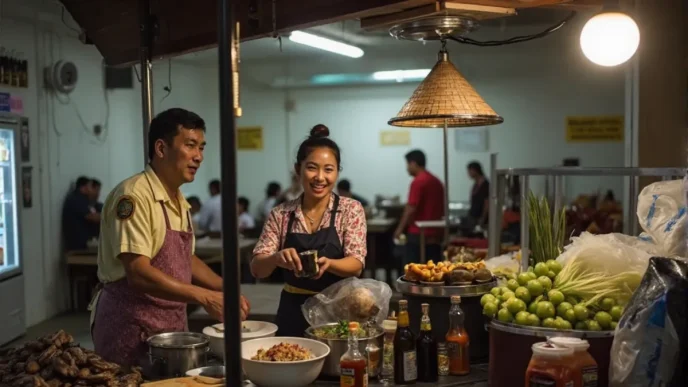Thailand is gearing up to seize a significant share of the global edible insect market, a sector projected to grow at an impressive 25.1% annually between 2025 and 2030. As the world pivots toward sustainable protein alternatives amid mounting environmental concerns, the Southeast Asian nation—already the sixth-largest insect exporter—sees a golden opportunity to leverage its expertise and favorable conditions to become a frontrunner in this innovative industry.
A Sustainable Shift in Global Food Systems
The push for sustainable protein sources is gaining momentum as consumers worldwide grapple with the environmental toll of traditional livestock farming, which accounts for roughly 14.5% of global greenhouse gas emissions, according to the Food and Agriculture Organization of the United Nations. Insect farming, by contrast, offers a far lighter environmental footprint, producing minimal emissions and requiring significantly less land and water. This makes it an attractive alternative for environmentally conscious markets, particularly in Europe, the Americas, and East Asia, where demand for insect-based products like protein powders and animal feed is surging.
Thailand, with its long-standing tradition of insect farming and consumption, is uniquely positioned to meet this demand. The country currently holds a 6% share of the global insect export market, valued at approximately US$586,000 in 2024, with the United States as its primary destination. The global edible insect market itself was worth US$1.35 billion last year and is expected to expand rapidly over the next decade, driven by growing awareness of sustainability and food security challenges.
Climate Resilience as a Competitive Edge
One of Thailand’s key advantages in this sector is the climate resilience of edible insects. While rising global temperatures threaten traditional livestock—potentially slashing yields by as much as 38% in some regions—many insect species thrive in warmer conditions. This adaptability could accelerate production cycles and bolster output, giving Thai farmers a competitive edge as other protein sources face mounting climate-related disruptions.
For rural communities across Thailand, insect farming offers a viable and potentially lucrative alternative to conventional agriculture. Crickets, grasshoppers, and mealworms, among other species, are already cultivated on a small scale in regions like Isaan, where insects have long been a dietary staple. Scaling up these operations could not only boost local economies but also align with global sustainability trends, positioning Thailand as a model for environmentally friendly food production.
Market Opportunities and Consumer Challenges
The opportunities in the edible insect market are vast, but they come with notable hurdles. In Western markets, where insect consumption is less culturally ingrained, unfamiliarity and skepticism remain significant barriers. Food safety concerns, often rooted in misconceptions about hygiene and production standards, also pose challenges to wider adoption. Even in Thailand, where dishes like fried crickets are a common street food, broader domestic acceptance of insects as a mainstream protein source is still evolving.
Nevertheless, the potential rewards are substantial. Insect-based products are increasingly finding their way into protein bars, snacks, and even high-end culinary offerings in markets like the European Union, where regulatory frameworks are beginning to accommodate these novel foods. Thailand’s government and private sector are keenly aware of this trend, with initiatives underway to promote both domestic consumption and export growth. Research highlighted by The Nation underscores this optimism, noting that “with our combination of local knowledge, favorable climate, and alignment with global sustainability trends, Thailand is uniquely positioned to become a leader in this growing market” said the study’s lead author.
Economic Implications for Thai Farmers
For Thai farmers, the shift to insect farming could be transformative. The low startup costs—compared to traditional livestock farming—make it an accessible venture for smallholder farmers. A single cricket farm, for instance, can be established with minimal investment in infrastructure, often using locally sourced materials. Moreover, the short breeding cycles of insects allow for rapid turnover, enabling farmers to generate income more quickly than with cattle or poultry.
The economic impact could be particularly pronounced in rural areas, where alternative income sources are often limited. By tapping into export markets, farmers could see returns in foreign currency, further stabilizing local economies. For example, a modest harvest of crickets sold to the US market could fetch prices competitive with other agricultural exports, with the added benefit of lower environmental costs. While exact figures vary, industry estimates suggest that a small-scale farm producing 1,000 kilograms of crickets annually could generate revenue equivalent to 50,000 Thai Baht (US$1,400), based on current exchange rates as of May 2025.
Government Support and Policy Needs
To fully realize this potential, government intervention will be critical. Policies that support research and development, standardize food safety protocols, and provide subsidies for farmers transitioning to insect production could accelerate growth in the sector. Public awareness campaigns, both domestically and internationally, are also essential to normalize insect consumption and dispel myths about safety and taste.
Thailand’s Ministry of Agriculture and Cooperatives has already signaled interest in promoting sustainable agriculture, including insect farming, as part of broader national goals to reduce carbon emissions and enhance food security. Partnerships with international organizations and private companies could further amplify these efforts, providing technical expertise and access to global supply chains. However, careful monitoring of large-scale production is necessary to prevent unintended consequences, such as overharvesting of certain species or environmental imbalances in farming regions.
Balancing Innovation with Tradition
Thailand’s journey into the global edible insect market also raises questions about preserving cultural traditions while embracing innovation. Insects have been part of Thai cuisine for generations, often prepared with local spices and served as snacks or side dishes. As the industry scales up to meet international demand, there is a risk that mass production could overshadow these artisanal practices, potentially alienating local consumers who value authenticity.
Striking a balance will require collaboration between policymakers, farmers, and culinary experts to ensure that Thailand’s insect farming sector remains rooted in its cultural heritage while adapting to modern market needs. Highlighting the unique flavors and nutritional benefits of Thai insect dishes in international marketing campaigns could serve as a bridge between tradition and innovation, appealing to both nostalgic locals and curious global consumers.
A Forward-Looking Vision for Sustainability
As the world grapples with the dual challenges of climate change and food insecurity, Thailand’s foray into the edible insect market offers a glimpse of what a more sustainable food system could look like. By capitalizing on its natural advantages and cultural familiarity with insect consumption, the country has the potential to not only boost its economy but also contribute to global efforts to reduce environmental degradation.
Yet, the road ahead is not without obstacles. Overcoming consumer hesitancy, ensuring regulatory compliance, and scaling production without compromising quality or tradition will test Thailand’s resolve. As the nation positions itself at the forefront of this burgeoning industry, the question remains: can it transform a niche market into a mainstream solution for sustainable protein, setting a precedent for others to follow?
















